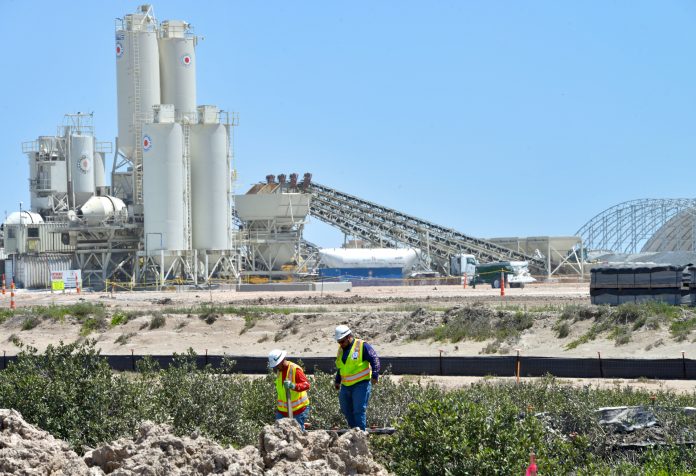
|
Only have a minute? Listen instead
Getting your Trinity Audio player ready...
|
NextDecade, parent company of Rio Grande LNG, has filed a petition for a rehearing on the D.C. Circuit Court’s Aug. 6 ruling that reversed federal authorization of the LNG export terminal project currently under construction at the Port of Brownsville.
Rio Grande LNG is listed as the intervenor in the petition, which specifically seeks “rehearing and rehearing en banc,” asking for a rehearing before the full court rather than the panel of judges that handed down the ruling. The D.C. court’s ruling vacated Federal Energy Regulatory Commission November 2019 authorizations of Rio Grande LNG, the associated Rio Bravo Pipeline Project, and another LNG terminal project proposed for the port, Texas LNG.
The court’s decision was in response to a lawsuit filed against FERC by the city of Port Isabel, the Sierra Club and other petitioners claiming that FERC failed to adequately consider environmental justice impacts and greenhouse gas emissions of the three projects as mandated by the National Environmental Policy Act (NEPA) and the Natural Gas Act.
FERC is conducting a supplemental Environmental Impact Statement for the projects in response to the court’s ruling, which held that FERC did not follow procedures for an environmental review that began in 2016, but did not find fault with the facility’s design, according to a Rio Grande LNG spokesman.
“This was a procedural ruling against FERC, but as a result, now, the multi-billion-dollar project faces an uncertain future if the ruling isn’t overturned in this rehearing,” he wrote in an email.
Otherwise, another full environmental review by FERC could take nine months or longer, creating delays for the project “across the board,” the spokesman said.
“This is unprecedented for an infrastructure project that’s fully permitted and under construction,” he added.
If the court’s ruling stands, large investment projects across sectors will suffer “by undermining investment security, innovation and development timelines,” the spokesman said.
The $18.4 billion Rio Grande LNG project, which broke ground a year ago, was scheduled for completion by early 2029. Reuters reported in September that NextDecade CEO Matt Schatzman vowed the company would appeal the ruling all the way to the Supreme Court if necessary.
“We are committed to taking any and all legal and regulatory actions to ensure that phase one (of Rio Grande LNG) will be delivered on time and on budget,” he was quoted as saying.
In its petition, Rio Grande LNG argues that rehearing by the full court is necessary because the Aug. 6 ruling created a split in the circuit court.
“A prior panel in this case considered similar NEPA issues and remanded without vacatur (vacating authorization), allowing this critical infrastructure project to proceed” with the view that reauthorization by FERC was nearly inevitable, according to the petition.
“But now, three years later, the project may collapse entirely, because of a vacatur order unmoored from NEPA’s text, established Circuit law, and infrastructure financing realities,” the document states.
FERC authorized the project five years following “extensive environmental review” and after determining that “the project’s only significant environmental impacts were visual — i.e., it could be seen by people nearby or who climb a local lighthouse,” according to the petition, which notes that FERC approved the project despite the visual impact because it “overwhelmingly serves the public interest.”
Loss of the project would mean the loss of thousands of high paying jobs, according to the petition. Currently, roughly 1,700 workers are employed at the 984-acre Rio Grande LNG site on the Brownsville Ship Channel, a number that would soon increase to 5,000 if the vacatur ruling were reversed and FERC authorizations restored, NextDecade said.
According to the petition, the judges panel erred in not taking into account the “enormous practical costs” of its decision to vacate the authorizations.
“It will not only bring a multi-billion-dollar project to a grinding halt, but may send the project’s financing — and thus the entire enterprise — into a death spiral,” according to the petition.



